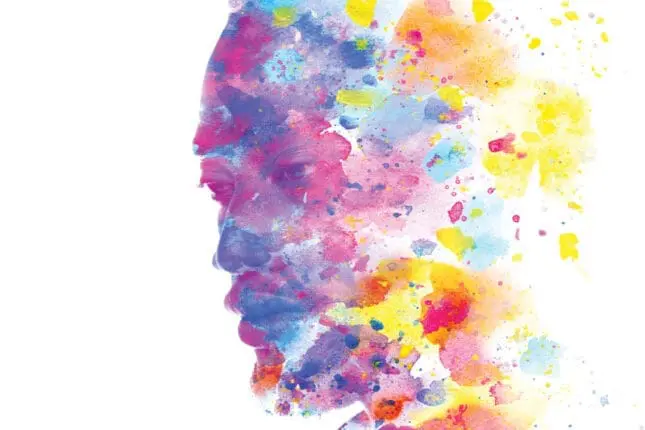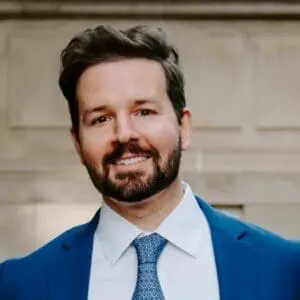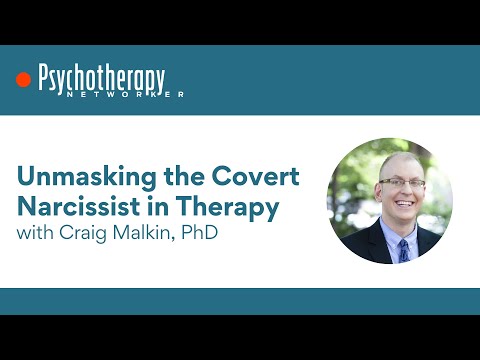Tasnim Sulaiman has been having a hard week. Two days before we sit down to talk, a 15-year-old armed with an assault rifle opened fire on a crowd gathering for Ramadan at a mosque in west Philadelphia. By the time the gunman was apprehended, three people had been critically wounded. For Sulaiman, a practicing Muslim and proud Philadelphian, the pain cuts deep. You can hear it in her voice—in the cracks and lilts and pauses. She’s strong—Philly strong—but a little weary, too.
After the shooting—and in the thick of running Black Men Heal, the nonprofit organization she founded—Sulaiman got a phone call from her fellow community organizers. Your city needs you right now, they said. It needs a leader. Could she help coordinate a community webinar, or a prayer group, or perhaps a trauma support group? they asked.
Sulaiman has gotten used to these kinds of phone calls. When you do what she does—and do it as well as she does—people are bound to look to you for help. In typical fashion, she humbly obliged.
“I never considered myself a leader before Black Men Heal,” she clarifies. “The emotional work of moving from being an individual therapist to providing healing for an entire community? It’s heavy. And I know the heaviness will be here as long as I’m doing this work.”
Six years ago, “this work” was merely a vision: to provide free sessions to Black men who’d otherwise be unlikely to go to therapy due to the cost, stigma, and lack of access. Brought to life with a handful of colleagues gathered around her kitchen table, Black Men Heal spans 15 states today. Funded by private donations, grants, and philanthropic gifts, its team of 60-plus clinicians provide eight free one-on-one sessions to roughly 400 men annually. Upwards of 3,500 men tune into their virtual groups, dubbed King’s Corner. And dozens of clients—even those who live far away—flock to their weekend retreats.
But here’s the kicker: after their free sessions expire, nearly 75 percent of these clients choose to continue therapy. It’s a figure that would make even the most successful private practices blush. Depending on which study you read, between 20 and 57 percent of therapy clients fail to return after their initial session. Another 37 to 45 percent quit after session two. By the end of session three, nearly half of all clients will have dropped out of treatment.
So what’s the secret to Black Men Heal’s success? Sure, you could attribute its high retention rates to those eight free sessions, by the end of which clients are, ideally, feeling settled and making inroads toward healing. But Sulaiman thinks something deeper is at work.
“It’s the cultural attending,” she says. “We focus on the unique cultural experiences of Black men in a world in which they’ve been dismissed and forced to deal with racism, incarceration, and disparities. This is a space where they can be themselves and don’t have to code switch. They feel seen, and when they feel seen, they can finally take off their armor.”
In other words, Black Men Heal therapists are doing culturally competent work. But at a time when public interest in cultural competence has surged, and everyone seems to be clamoring for cultural competence training, the term has become somewhat distorted. What does it really mean to be a culturally competent therapist?
The Concordance Hypothesis
Undeniably, part of Black Men Heal’s success lies in the fact that nearly all of its practitioners, like its clients, are people of color, which makes for an immediate cultural connection. “This is therapy by us, for us,” Sulaiman says.
Sure enough, a sizeable body of research supports what’s become known as the concordance hypothesis, which states that clients paired with therapists who share one or more demographic traits—such as gender, social class, age, ethnicity, race, language, sexual orientation, beliefs, or values—have better communication, perceptions of care, and outcomes than those paired with therapists who don’t. According to a 2022 article published in the Journal of Racial and Ethnic Health Disparities, “patients with racially discordant providers exhibited greater attrition, particularly among Black patients who were treated by white therapists,” in large part due to “the lack of trust in white therapists, as a reflection of historical and contemporary experiences.”
This doesn’t mean the psychotherapy field hasn’t spent decades training clinicians of all backgrounds to develop cultural competence. The term was first popularized in a clinical context in 1989, when Terry Cross, the founder of the National Indian Child Welfare Association, wrote Towards a Culturally Competent System of Care. “Cultural competence,” he argued, “is a set of congruent behaviors, attitudes, and policies that come together in a system, agency, or among professionals and enable that system, agency, or those professionals to work effectively in cross-cultural situations.”
Since then, nearly every major mental health organization and psychotherapy graduate program has issued public statements in support of, or guidelines pertaining to, cultural competence. The National Association of Social Workers has been particularly outspoken on this issue, releasing its Standards and Indicators for Cultural Competence in Social Work Practice in 2015, which strongly suggests its clinicians make cultural competence “an ongoing part of their professional development” and “advocate for the infusion and integration of cultural competence in social work curricula and research at the BSW, MSW, and PhD levels.”
But these efforts have been hampered by the field’s historical—and current—lack of diversity. Although the number of psychologists of color more than doubled between 2000 and 2019, from 7,140 to about 19,000, according to the APA, the profession remains overwhelmingly white—81 percent, to be exact. Meanwhile, only five percent of American therapists are Black, eight percent are Hispanic, and three percent are Asian. Twelve percent identify as members of the LGBTQ+ community. And female therapists significantly outnumber their male counterparts, making up 69 percent of all clinicians.
According to a 2019 study published in Training and Education in Professional Psychology, nearly 85 percent of psychologists surveyed reported that their cultural competency graduate training included a course in diversity, supervised clinical experience with diverse populations, and didactic training about cultural competency. But a separate study, published in 2022 in Professional Psychology: Research and Practice, found that these courses focus predominantly on race, ethnicity, and sexual orientation. Less than 17 percent cover other important cultural categorizations, like religion, immigration status, and socioeconomic status.
Of course, all of this has implications for client satisfaction, retention, and outcomes. With a shortage of clinicians of color and cultural competency training falling short, it’s easy to see why Black Men Heal stands out: It’s addressing some of the field’s most egregious and longstanding deficiencies. Pairing clients with therapists likelier to have a shared cultural experience builds trust and connection faster—which means the work happens faster.
The concordance hypothesis appears to hold weight. This may be hard for some clinicians to swallow, especially those who don’t share identity characteristics with their clients but still strive to do effective, culturally competent work. We certainly can’t relegate the entire field to working only with clients they identify with culturally. So where does this leave us?
A Step Further
According to licensed professional counselor Monica Band, who provides training in culturally competent and responsive therapy, even if a therapist’s identity syncs up with their client’s, their cultural competence depends on an introspective process that involves considering the inherent power dynamic in the consulting room.
“As the clinician, you have to ask yourself ‘Who am I when I’m in a position of power as a therapist, when someone’s coming to me for a service, and how does my identity impact that process?’” Band, who’s Chinese American, says she’s sometimes sought out by Asian clients looking to work with an Asian therapist, who she says often believe their apparent similarities create a fast lane to discussing certain topics. But even when she and her client share a background, Band wants to have a deeper conversation about identity and her clients’ experiences of othering to avoid unhelpful projection and transference.
Band says white therapists working with clients who don’t share their ethnic or racial background might say, “I’m white, and I’d like you to think about that, because it may impact whether you feel safe and bring up certain things. It also limits my ability to understand your experience.” In her view, at a minimum, clinicians practicing cultural humility need to say, “I don’t know everything, and I’m different from you in many ways.” The danger, Band says, is that because it sounds so simple, we often presume we don’t have to say anything. “We should acknowledge our differences, not as a point of contention, but as a way of modeling that we aren’t just willing to go there, it’s necessary to go there.”
S. Kent Butler, former president of the American Counseling Association and former interim chief equity, inclusion, and diversity officer at the University of Central Florida, offers a more straightforward take on how to demonstrate cultural competence: be yourself.
“It’s all in how you show up,” he says. “You have to be authentic. You can’t go in thinking, I have to speak my client’s dialect. You just need to show up without reservation, with openness and curiosity. If you have a passion for understanding people and ask about things you truly want to know about, they’ll open up and communicate with you. Clients can detect when you’re being fake or trying to fit in; and when they do, they’ll turn away from you.”
When it comes to authenticity, Butler adds, a little self-disclosure goes a long way. “Clients want to know who you are, what you represent, and how you’ll advocate for them,” he says. “Even if you’re not the same hue, if your clients know you’re a part of the community—that you go to a local church or shop in the same stores as them—they’ll be more likely to accept you because they know you want to be there, because you’re on the battle lines with them.”
The Armor Comes Off
At a recent Black Men Heal retreat, 80 attendees gathered in a conference room at the University of Pennsylvania, joined by three facilitators. These retreats are special, Sulaiman says. “We don’t just do wellness,” she explains, “we roll out the red carpet. We call the men kings. We feed them and give them facials and massages. We nurture and pamper them in ways men aren’t used to.”
By now, the men had experienced the pampering and shared some moments of connection with fellow participants, but there was still a palpable trepidation in the room. This was therapy, after all. It would take vulnerability—in front of men they didn’t know especially well—and it would be hard.
The three facilitators recapped this retreat’s theme: Letters to My Father. To start, each of them shared a letter they’d written to their father. One of these fathers happened to be in attendance, a 70-something man with gray hair, whom the other attendees had lovingly nicknamed Pops. When the facilitator read Pops his letter, recounting how the two had never had much of a relationship when he was a boy and the lasting pain it had inflicted, tears rolled down Pops’s cheeks. “I’m sorry I wasn’t there for you,” he said, wrapping his son in his arms.
I ask Sulaiman what she looks for in the therapists she hires for Black Men Heal. “I need somebody who the men are going to relate to,” she says. “If our clients don’t respect us or see themselves in us, then this doesn’t work.” Yes, clients may go faster, and perhaps further, with someone who shares their racial or ethnic background, but it’s not everything. “After a point, race doesn’t matter,” Sulaiman adds. “Life experience has shaped who you are.”
Sulaiman and her fellow Black Men Heal therapists are so effective in their work precisely because they have a keen understanding of what nearly every study of therapy’s efficacy has revealed: the most important predictor of outcomes isn’t just a matter of the therapist’s or client’s identity, but the quality of the connection between them. By righting therapy’s inherent power structures with some authentic self-disclosure, these therapists have taken the work a step further.
By the time the attendees are asked to write and read aloud their own letters to their father, the walls have come down. Stories of love, pain, and hope follow. They share wisdom they’d learned from their fathers and carry with them. They share experiences that shaped their definitions of manhood. They share burdens they hope to leave behind, and lessons they wish to pass on to their own children.
Afterward, the older men in attendance form a line at the front of the room so that the younger men—many of whom had confessed that they’d never been lovingly touched by their father—can hug them. And when they do, the older men whisper affirmations in their ears: “It’s gonna be okay,” they say, squeezing them tight. “You’ve got this. Keep going.”
This is where the magic happens, Sulaiman says. “When I see a room full of men in tears, vulnerable and standing in line for a hug, I know what we’re doing is special. This has become more than just therapy. It’s collective healing.”
Course-Correcting
Cultural competence is an elusive thing. There will always be visible and invisible differences between therapists and clients. But Black Men Heal rolls with it. Most of its therapists are women, who sometimes run up against vastly different life experiences working with men. Sulaiman teaches her therapists that attuning to your client is a dance of sorts, what she calls “adopting your client’s energy.”
“Sometimes when I’m working with men and they voice their frustrations with women, they quickly apologize out of fear of offending me,” she says. “I tell them they should express themselves however the feelings come.” It’s a moment of disconnection, quickly and skillfully followed by repair and realignment.
Although our field doesn’t have a great track record of helping clinicians develop cultural competence, Band says she’s heartened by the next generation of therapists. “They’re moving toward a more action-oriented space,” she says, “toward care that has a social justice bent. They’re thinking about what actions and advocacy stances they’re taking. They’re challenging and unlearning old methods and teachings.”
Before our call comes to an end, I ask Sulaiman a final question, one I’d almost overlooked: What inspired her to create Black Men Heal, sitting at her kitchen table six years ago?
She pauses.
“My father fought in Vietnam, went to prison afterward, and joined a gang. He went through a lot of shit, and developed PTSD because of it. He couldn’t show up as the person I wanted him to be, and I always wished something like Black Men Heal had existed for him before he passed away. I had a vision to heal intergenerational trauma, and doing this felt like picking up my father’s spirit.”
But the story doesn’t end there, Sulaiman says.
“Last week, my little brother invited me and my siblings over to his house and gave us each a box. Inside were letters my father had written to us from prison when we were kids. For a long time, I held on to the narrative that he’d had a militant side I couldn’t connect with, but these letters showed me that he’d been loving and nurturing in his own way. I’ve spent the past two days crying my eyes out, finally understanding who my father was. I realized that my father was all of these men I’m serving. Their stories are familiar now. These men are my father, and my father was these men. They’re doing the best they can, just trying to survive. I’m grateful for this work,” she concludes. “I’m grateful for the healing it’s helped me do within myself.”
I thank Sulaiman for sharing, and tell her I hope she gets some well-deserved rest. But in yet another display of humility, she says she can’t take credit for the hard work.
“I’m not the one doing the emotional labor,” she says. “These men are. I’m just offering the invitation, saying ‘Hey, if you’re curious, if there’s a part of you that’s struggling, you can come here and you’ll be loved and you’ll be seen. You’ll have an experience that you won’t find anywhere else.”
ILLUSTRATION © LUMEZIA.COM
Chris Lyford
Chris Lyford is the Senior Editor at Psychotherapy Networker. Previously, he was assistant director and editor of the The Atlantic Post, where he wrote and edited news pieces on the Middle East and Africa. He also formerly worked at The Washington Post, where he wrote local feature pieces for the Metro, Sports, and Style sections. Contact: clyford@psychnetworker.org.













